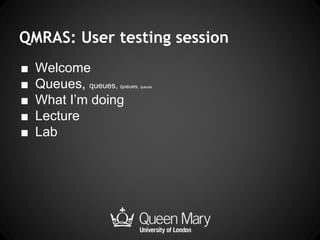QMRAS user testing
- 1. QMRAS: User testing session ■Welcome ■Queues, queues, queues, queues ■What I’m doing ■Lecture ■Lab
- 3. Queues
- 4. A queue is a line of people
- 5. A queue, technically is... λ = Arrivals 𝑚 = Servers if λ > 𝑚 : queue if λ >= 𝑚: ¬queue
- 7. A queue management system controls the queue, and collects data to perform analysis on the queue.
- 9. What I’m really doing
- 10. ECS001* Welcome to the Web Design module. Today’s focus: HTML *Fictional
- 11. Prajith Rakunathan’s HTML lesson.
- 12. ECS001 Teaching Team Misha (Ibtisam) Lecturer & module convenor Nicolaos Teaching Assistant Marzena Teaching Assistant
- 13. Labs â– Fill in the blanks exercise â– Questions about work go to teaching team â– Questions about QMRAS go to Gary (me) â– Use QMRAS on any Internet enabled device you think is most appropriate (encouraged) 1. Navigate to QMRAS and login 2. Enrol on ECS001: Web Design 3. Complete worksheet 1. Fill in testing sheet as you progress through the lab 2. Request assistance via QMRAS 4. Once finished, request assessment via QMRAS Flow
- 14. Questions?
Editor's Notes
- #2: Thanks for coming everyone, you will be the first group to test the Queen Mary Resource Allocation System. So this session will last about less than half an hour and will consist of a short presentation from me and what we are all doing here, a short presentation from Misha about the lab work you will be doing and a lab session which will last a few minutes.
- #3: Before I go too much further, I just wanted to say that I have an ear infection (not contagious) but it has limited my hearing and as a result I can’t hear myself well at all which explains my fluctuating speech levels. If you can’t hear or mishear honestly just interrupt and let me know.
- #4: Ah, queue’s. Love them, hate them, they’re here to stay.
- #5: So a queue is really just a line of people. The queue can be measured, tracked and queueing theory lets us perform maths on this, to predict how the queue works and how to make it more efficient.
- #6: There can only be a queue if there is a line that outweighs the number of people waiting for resources, because otherwise the system can naturally afford the people requesting service.
- #7: Waiting is frustrating. The truth of this assertion rings true for my Mum as you can see here. A queue must provide value.
- #8: A queue management system controls the queue and collects data to analyse the queue. This is what the resource allocation system does that you will be helping to test today.
- #9: My final year project is to investigate the effectiveness of smart resource allocation strategies, namely what I am doing is looking at how teaching resources are allocated in the ITL and how we can make this more effective,
- #10: Which involved creating a queue management system, QMRAS. And looking at the mathematics behind it - I’m using a Poisson based multi-phase queue if you’re interested.
- #11: So the work you will be doing isn’t actually the point of my project. You will be completing a short lab exercise and will get this marked by teaching staff. QMRAS acts as a layer to manage the communication between you as students and the teaching staff on the module. Over to Misha.
- #12: So Prajith (wave Praj) created this video to teach beginners about HTML and this should be useful to completing the lab exercise.
- #13: So this module has three members of teaching staff, all of which will provide help and act as servers in the queue. They are Misha, Nick and Marz. If you have questions about the work then one of these guys will help you if you request help using QMRAS. If you have any questions about QMRAS then that’s what I am here for, these guys might not have the answers you are looking for.
- #14: So, work through the exercise sheet and complete the testing session sheet as you go through the lab. Read it first to get an idea of what to look out for. These instructions are on the sheet. So we will go into the lab now and if you go to the URL on the sheet, log in, enrol to ECS001 and work through the sheet. Remember to request help via QMRAS exclusively, and remember to leave the queue after you have been served. And if we could all stay close together on this side of the ITL that would make everything a lot easier.
- #15: If there aren’t any questions then let’s go into the lab.














